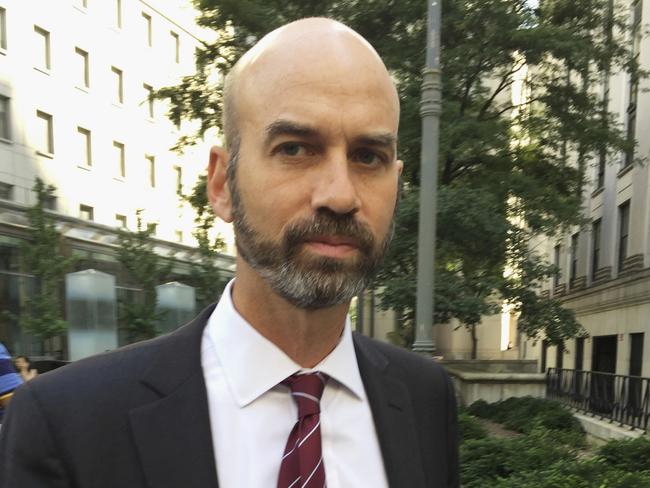US protest: New York Times opinion page editor resigns amid backlash
James Bennet resigned amid backlash over a Republican senator’s op-ed which called for the US government to ‘send in the troops’.

The New York Times editorial page chief resigned, becoming the second prominent US newspaper editor to lose his job over decisions related to coverage of civil unrest following the killing of George Floyd.
James Bennet will be succeeded by Deputy Editorial Page Editor Kathleen Kingsbury, who will serve as acting editorial page editor through the end of the 2020 presidential election cycle, the New York Times said on Sunday.
James Dao, a deputy editorial page editor, will be removed from the company’s masthead and reassigned to the newsroom, the company said.

In an interview, New York Times Publisher A.G. Sulzberger said the paper’s op-ed section needed “significant change,” and that it would have been hard for Bennet and Dao “to lead that effort.” The company said Bennet and Dao weren’t available for comment.
Bennet’s resignation comes less than a week after the New York Times opinion section published an op-ed from Senator Tom Cotton that called for the US government to deploy military troops as part of “an overwhelming show of force” to deter looting amid protests sparked by the killing of Mr Floyd, a black man, while in police custody in Minneapolis last month.
The op-ed, originally titled Send In the Troops, was criticised by many New York Times reporters and editors on social media, who said it endangered their black colleagues covering the continuing protests across the US and contained factual errors.
Editors appended a note to the column later in the week saying that it contained overstatements, unsubstantiated claims about left-wing activists and a misquotation.
“This editors’ note is another humiliation to The New York Times,” Senator Cotton wrote on Twitter on Friday, saying that he stood by “every word I wrote”.
A misplaced ellipsis? The horror! I confess error and, like The New York Times leadership, throw myself on the mercy of the child mob now running the newspaper.
— Tom Cotton (@TomCottonAR) June 6, 2020
This editors' note is another humiliation to The New York Times.
I stand by every word I wrote. pic.twitter.com/PBP1B5Y3xN
Bennet is the second prominent editor at a major US newspaper whose resignation was announced this weekend. Stan Wischnowski, the top news editor of the Philadelphia Inquirer, resigned on Saturday following the publication of a headline that drew condemnation from readers and the newspaper’s staff. The headline, Buildings Matter, Too, appeared over a column from the paper’s architecture critic in Tuesday’s print edition. Inquirer editors later apologised for the headline.
Opinion Editor at @nytimes just walked out. That’s right, he quit over the excellent Op-Ed penned by our great Senator @TomCottonAR. TRANSPARENCY! The State of Arkansas is very proud of Tom. The New York Times is Fake News!!!
— Donald J. Trump (@realDonaldTrump) June 7, 2020
Bennet said during a newsroom-wide town hall on Friday that he didn’t read Senator Cotton’s piece before it was published, a point of frustration for employees at the New York Times who saw the op-ed as harmful, according to people familiar with the matter.
Mr Sulzberger said that there has been “a real breakdown in the process that produced a piece of work that fell far below our standards”. He suggested that the digital, mobile, and social-media era has fundamentally changed how the op-ed page is perceived. In a print-only era, he said, readers could see immediately that there was an institutional editorial voice on one page, and that there were a number of editorial pieces expressing a wide array of views on the opposite page — a context that online pieces don’t have.
Sulzberger said the Times remains “deeply committed” to offering a variety of opinions.
In recent days, as protests condemning police brutality swept the nation, journalists have taken to social media to criticise their employers, saying they neglect issues of racial justice, both in their coverage plans and in their hiring priorities. Ashley Edwards, a former editor at women-focused digital news organisation Refinery29, said on Twitter that black employees at the Vice Media-owned outlet weren’t paid fairly or promoted into seniormost positions. In a statement posted to Twitter Thursday, Refinery29 acknowledged the criticism and said it was undertaking a “comprehensive” assessment.
Occasionally, the conversations on social media have turned acrimonious. Claudia Eller, the editor in chief of Variety, was placed on a leave of absence last week after she got into an argument on Twitter with former Hollywood Reporter editor Piya Sinha-Roy on the subject of newsroom diversity, calling her “bitter.” Ms. Eller apologised for the remarks in a note to Variety staff Thursday.
Bennet joined the New York Times in 2016 from the Atlantic magazine, where he was editor in chief. Before that, he held various positions at the New York Times for more than a decade, including White House correspondent and Jerusalem bureau chief.
Until recently, Bennet was viewed internally as a candidate to succeed New York Times Executive Editor Dean Baquet when he retires, according to a person familiar with the matter. Several journalists at the New York Times said this past week that they would not work for Bennet if he succeeded Baquet, the person said.
Bennet’s run as editorial page editor was marked by controversy. In January, weeks after the opinion section published The Secrets of Jewish Genius, a piece by columnist Bret Stephens that referenced a study by an author who promoted racist views, the newspaper expanded its standards department to advise the opinion section.
In February 2018, the opinion section parted ways with tech writer Quinn Norton, a recent addition to the editorial board, after critics pointed out social media posts by Ms. Norton that included gay slurs.
Norton said at the time on Twitter that she was “sorry I can’t do the work I wanted to do with them,” adding “no harm no foul.”
Bennet, the brother of Colorado Democratic senator and former presidential candidate Michael Bennet, recused himself from opinion pieces related to the 2020 presidential election when his brother joined the race.
During a tense all-hands meeting on Friday, Bennet said he would use the reaction to Senator Cotton’s op-ed as an occasion to rethink the operations of the opinion department, according to people familiar with the matter. At the meeting, Bennet said that some senior editors reviewed the column but that the headline wasn’t extensively workshopped and the most senior fact-checker wasn’t assigned to it, the people said.
Wall Street Journal



To join the conversation, please log in. Don't have an account? Register
Join the conversation, you are commenting as Logout